#Sourced Terms
Text
Feative
[PT: Feative /End PT]

[ID: A five stripe flag. From top to bottom the colors are medium green, medium light green, light green, desaturated warm purple, light warm purple. /End ID]
Feative:
Someone who is introjected based on or is otherwise sourced from one or two typically key features of someone/something, but shares nothing else in common.
For example seeing someone who is so excited about something, and introjecting some else who's really excited about one thing (may or may not be the same thing), but has nothing else in common with who they introjected from.
While this by default is classified as an introject or otherwise sourced headmate term, one may or may not consider themself either partially or wholly brainmade or otherwise non-sourced due to only being from one or two features.

[ID: A thin light green line. /End ID]
Etymology: Feat- from Feature and -tive from the pattern of words like "Fictive", "Factive", "Fogtive".

[ID: A thin light purple line. /End ID]
This was originally coined by us on the Otherkinder discord server on Tuesday, September 26th, 2023 at 7:29 AM, and has been shared in a couple discord servers since then. However, we wanted a publicly available post both for easy finding of the term, as well as a place to link to when we add it to Pluralpedia.
#-Zev#Feative#Has PT#Has ID#Pro Endo#Endo Safe#Terms#Flags#Plural Terms#Plural Flag#Plural Coining#System Terms#System Flag#System Coining#Plurality#Introject Terms#Sourced Terms
13 notes
·
View notes
Text

Ah yes. The good old days when shipping wars hadn’t been invented yet. Before the existence of antis when we all lived in harmony -

No, no. Tumblr and twitter had *created* puritan culture. I mean before then.

No no no before then. Before social media poisoned everything-

Before then….?
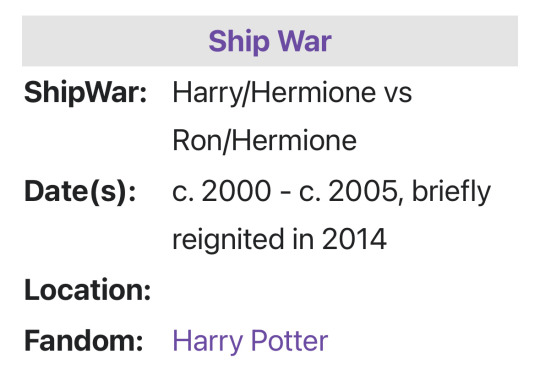
Before….

Well surely shipping wars didn’t exist before the internet-



#I tried to include sources but tumblr mobile straight up wouldn’t let me add hyperlinks sorry#might go back and add them later but most came from fanlore.org but they didn’t have much in terms of pre 90s so#the last ones come from fandom.org I’m so sorry
3K notes
·
View notes
Text
Glossary of Nautical Terms - as used in the late 18th and early 19th centuries
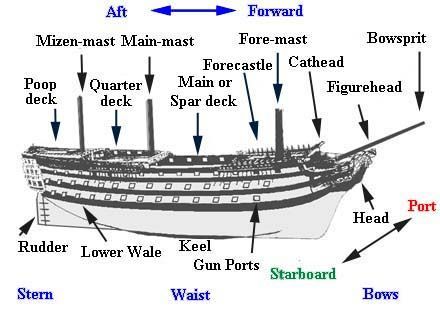
Aft: at or towards the stern or after part of a ship, the opposite of bow.
Aloft: overhead, or above.
Athwart: across.
Bank: a rising ground in the sea, differing from a shoal, because not rocky but composed of sand, mud or gravel.
Becalmed: to halt through lack of wind.
Bow: the foremost end or part of a ship, the opposite of stern.
Bowsprit: a large mast or piece of timber which stands out from the bow of a ship.
Burthen: the older term used to express a ship's tonnage or carrying capacity. It was based on the number of tuns of wine that a ship could carry in her holds, the total number giving her burthen.
Chase, to: to pursue a vessel in wartime with the aim of capturing, acquiring information from her, or destroying.
Colours: the name by which the national flag flown by a ship at sea is known, used to determine nationality.
Dead reckoning: a system of navigation where the position of a ship is calculated without the use of any astronomical observation whatever.
Fair wind: a wind favourable to the direction a ship is sailing.
Fathom: a measure of six feet, used to divide the lead (or sounding) lines in measuring the depth of water; and to calculate in the length of cables, rigging, etc.
Fore: the forward part.
Hail, to: to call to another ship.
Helm: the instrument by which the ship is steered, and includes both the wheel and the tiller, as one general term.
Jib: a triangular sail set by sailing ships on the boom which runs out from the bowsprit.
Jury-mast: a temporary makeshift mast erected to replace a mast that has been disabled or carried away.
Jury-rudder: a makeshift arrangement to give a ship the ability to to steer when she has lost her rudder.
Keel: the lowest and principal timber of a wooden ship - the single strongest member of the ship's frame.
Knot: the nautical measure of speed, one knot being a speed of one nautical mile (6,080 feet) per hour. As a measure of speed the term is always knots, and never knots an hour.
Landfall: the discovery of the land.
Land-locked: sheltered all round by the land, so that there is no view of the sea.
Lead: an instrument for discovering the depth of water, attached to a lead-line, which is marked at certain distances to measure the fathoms.
Lee: the side of a ship, promontory, or other object away from the wind; that side sheltered from the wind. It is the opposite side to windward.
Lee shore: a coastline on to which the wind blows directly - consequently it can be dangerous as the wind tends to force the sailing ship down on it.
Leeward: with the wind; towards the point to which the wind blows.
Letter of Marque: a commission issued in Britain by the Lord High Admiral or Commissioners of the Admiralty authorizing the commander of a privately owned ship to cruise in search of enemy merchant vessels. The letter of marque described the ship, her owners and officers, the amount of surety which had been deposited and stressed the necessity of having all prize vessels or goods seized condemned and valued at a Vice Admiralty Court for the payment of 'prize money'.
Lie-to: to prevent a vessel from making progress through the water - achieved by reducing sail in a gale. The objective is to keep the vessel in such a position, with the wind on the bow, as to ensure that heavy seas do not break aboard.
The Line (or 'Crossing the Line') Sailing across the Equator. Nautical tradition where seamen celebrate the crossing of the equator by dressing up and acting out a visit by King Neptune. Those who have not previously crossed the line are summoned to the court of Neptune for trial, followed by a ritual ducking (in a bathing tub of seawater) and sometimes lathered and roughly shaved.
Mainsail: the principal sail of a sailing vessel.
Mizzen (or mizen): the name for the third, aftermost, mast of a square-rigged sailing ship or of a three-masted schooner.
Muster: to assemble the crew of a ship on deck and call through the list of names to establish who is present and accounted for.
Muster-book: the book kept on board a vessel in which was entered the names of all men serving in the ship, with the dates of their entry and final discharge from the crew. It was the basis on which victuals were issued and payment made for services performed on board.
Pintle: a vertical metal pin attached to the leading edge of the rudder; it is fitted into the metal ring or 'gudgeon' bolted to the sternpost of a vessel. This provides the means for hinging the rudder on the sternpost and allows a rudder to be swung or turned as desired (by use of the tiller); where necessary (ie. when the rudder needs to be removed or repaired) the pintles can be unshipped quickly and the rudder detached.
Port: the left-hand side of a vessel as seen from the stern; also a harbour or haven.
Privateer: a privately owned vessel armed with guns which operated in time of war against the trading vessels of an enemy nation. Each privateer was given a a 'letter of marque' which was regarded as a commission to seize any enemy shipping as a 'prize'. The name 'privateer' has come to refer to both the ship and the men who sailed in her.
Prize: name used to describe an enemy vessel captured at sea by a ship of war or a privateer; also used to describe a contraband cargo taken from a merchant ship. A 'prize court' would then determine the validity of capture of ships and goods and authorize their disposal. 'Prize' in British naval history always acted as considerable incentive to recruitment with many men tempted to join the navy in anticipation of quick riches.
Prize Court: Captured ships were to be brought before prize courts where it was decided whether the vessel was legal prize; if so, the whole value was divided among the owners and the crew of the ship.
Prize Money: the net proceeds of the sale of enemy shipping and property captured at sea - these proceeds were distributed to the captors on a sliding scale from highest rank to lowest seaman.
Road or Roadstead: a stretch of sheltered water near land where ships may ride at anchor in all but very heavy weather; often rendered as 'roads', and does not refer to the streets of a particular port city but rather its anchorage, as in 'St Helens Roads', the designated anchorage for shipping located between St. Helens (Isle of Wight) and Portsmouth, or 'Funchal Roads' at the island of Madeira. (see Elizabeth Macquarie's 1809 Journal).
Quarter: (1)the direction from which the wind was blowing, particularly if it looked like remaining there for some time; (2)the two after parts of the ship - strictly speaking a ship's port or starbord quarter was a bearing 45° from the stern.
Ship: from the Old English scip, the generic name for sea-going vessels (as opposed to boats). Originally ships were personified as masculine but by the sixteenth century almost universally expressed as as feminine.
Shoal: a bank or reef, an area of shallow water dangerous to navigation. Sounding: the of operation of determioning the depth of the sea, and the quality of the ground, by means of a lead and line, sunk from the ship to the bottom, where some of the sediment or sand adheres to the tallow in the hollow base of the lead.
Sound: (1) to try the depth of the water; (2) a deep bay.
Sounding: ascertaining the depth of the sea by means of a lead and line, sunk from a ship to the bottom.
Soundings: those parts of the ocean not far from the shore where the depth is about 80 to 100 fathoms.
Spar: a general term for any wooden support used in the rigging of a ship - includes all masts, yards, booms, gaffs etc.
Squall: a sudden gust of wind of considerable strength.
Starboard: the right-hand side of a vessel as seen from the stern.
Stern: after-part of a ship or boat.
Tack: the nautical manouevre of bringing a sailing vessel on to another bearing by bringing the wind round the bow; during this manouevre the vessel is said to be 'coming about'.
Tide of Flood: the flow of the tidal stream as it rises from the ending of the period of slack water at low tide to the start of the period of slack water at high tide; its period is approximately six hours.
Trade Winds: steady regular winds that blow in a belt approximately 30 N. and 30 S of the equator. In the North Atlantic the trades blow consistently all year round, from the north-east; in the South Atlantic they blow from the south-east, converging just north of the equator. The meeting of the trade winds just north of the equator created the infamous 'doldrums', where sailing ships could be becalmed for days or weeks waiting for a wind to carry them back into the trades.They were known as trade winds because of their regularity, thereby assisting sailing vessels in reaching their markets to carry out trade.
Under way: the description of a ship as soon as she begins to move under canvas power after her anchor has been raised from the bottom; also written as 'under weigh.'
Voyage: a journey by sea. It usually includes the outward and homeward trips, which are called passages.
Watch: (1) one of the seven divisions of the nautical day; (2) one of two divisions of the seamen forming the ship's company.
Wear: the nautical manouevre of bringing a sailing vessel on to another tack by bringing the wind around the stern.
Weather: in a nautical sense (rather than a meteorological) this is the phrase used by seamen to describe anything that lies to windward. Consequently, a coastline that lies to windward of a ship is a weather shore; the side of a ship that faces the wind when it is under way is said to be the weather side a ship, etc.
Weigh: to haul up.
Weigh anchor: the raising of the anchor so that the ship is no longer secured to the sea or river bottom.
Windward: the weather side, or that direction from which the wind blows. It is the opposite side to leeward.
Yard: (1) a large wooden spar crossing the masts of a sailing ship horizontally or diagonally, from which a sail is set. (2) a shortened form of the word 'dockyard, in which vessels are built or repaired.
Sources:
JEANS, Peter D. Ship to Shore: a dictionary of everyday words and phrases derived from the sea. Santa Barbara: ABC-Clio, 1993.
The Oxford Companion to Ships & the Sea. (ed.) Peter Kemp. Oxford: Oxford University Press, 1976.
#naval history#naval artifacts#ship terms#not from me#sources below#18th century#19th century#age of sail#infos
739 notes
·
View notes
Text

quick drawing of my vintage eevee plush, which is older than me and can legally drink
#eevee#pokemon art#pkmn art#pokeart#doodle#(picture is from a collector but I have the same plush!)#using the term 'vintage' very loosely here; its only from 2001 (according to sources)
888 notes
·
View notes
Note
So...... Loop and Odile huh?


v THE OTHER RESPONSE I DOODLED v


yeagh
#isat#in stars and time#loopdile#isat spoilers#spoilers#myart#fanart#siffrin#loop#Look#Loop considers Siffrin to be worthy of redemption#but they may not hold themselves to the same level of forgiveness#where softness and comfort are what Siffrin needs from his party#Loop would struggle#because if they're with the party they're in a different role than they were before the loops#they cant have what they used to have and that would chafe at them with every little comfort and hug#this leads up to Odile not being as emotionally robust as Isa and Mira but she IS logical and doesnt take any shit#Loop and Odile getting together is a NEW dynamic to Loop#they wouldn't feel like an interloper#plus they canonically find Odile someone to emulate so they heavily respect her as a baseline#idk i just think Loop would get more catharsis from someone who would give them what they wanted in terms of self flagellation#but also someone who wouldn't let them escape afterwards and would force them to acknowledge the source of their pain#changing is destruction n I think Loop needs to get broken a few times before healing#like if Siffin and Loop were broken bones#the party caught Siffrin and were able to set him straight before he healed wrong#Loop healed in a super fucked up way and its causing pain for everyone#sFNFnGFGN IDK ITS LIKE#NOT A ROMANTIC SHIP#ITS SOMETHING COMPLICATED#but i also want Loop to whimper yknow
250 notes
·
View notes
Text


















#oscar piastri#f1#formula 1#mclaren#webweave#i have no idea if this makes sense to anyone but me#but i needed to get the idea out for my own sanity#will probably clean some things up in terms of formatting/links/sources later#also researching about the alpine situation make me so so mad for oscar
378 notes
·
View notes
Text
yknow i joke about pjo fandom being "ableism fandom" cause of how ironically the fandom behaves about disability themes in the franchise (and within the community) but the notes on that one post are apparently indicating the majority of the fandom legitimately did not process any disability themes in the entirety of the series besides being explicitly told in direct terms that demigods have adhd/dyslexia and that actually explains a lot
#pjo#riordanverse#disability#idk what to tag this im just exhausted#honorary mention to the only other time the fandom can apparently identify themes outside of it being directly spelled out for them#is when utilizing extremely stereotyped depictions/concepts/etc about said thing#and either way a solid 80% of the time they end up being ableist about it#also bonus shoutout to the extension of this being when the fandom tries to apply it on their own but all they know is the stereotypes#or just spelling it out in direct terms but never actually depicting it#two things that have now just become standard in the source material
179 notes
·
View notes
Text
i have a lot more to criticize about this show but let me tell you guys the real tea of it all..
the writer's team for HOTD simply does not know how to portray war.
they don't know the complexities of war, nor do they hold a knowledgable grasp of the true horrors of it and how it affects everyone from the powers orchestrating it (eg. the blacks and the greens) to the people at the bottom.
now, i'm not saying that they should put on their soldier helmets and go fight in wars, because that's stupid and as much as i dislike them, i don't want that for them at all, but i am pointing out that they clearly don't understand that the dance isn't an easy heroes v. villains superhero battle that they have written it out to be, because it's not.
it's a criticism of war and its destructive nature, of the powers that basically damn innocent people to die for nothing because of their rulers aka. the people who should be protecting them ultimately letting their desires cloud their duties to the land they're overseeing. for the writers to not understand that and basically glaze over what george was basically saying through the text in favor of producing HBO's attempt at marvelizing the WOIAF is truly gutting, because why even try to make war a winning game? it isn't.
fuck, even movies and tv shows outside of that do so much better at portraying the messages that the OG dance has that HOTD has failed to drive home. come and see, all quiet on the western front, even the hunger games especially in mockingjay— those are fantastic media that accurately or even come completely close to portraying how devastating war can get. so much horror, grief, rage and overall tragedy is shown in the three pieces of media that i just listed, so it is insulting to me and hopefully to others that ryan and co. had not seriously considered looking to them or any other media for inspiration on how to accurately hit the mark on the original story's real themes for the show.
#i've been rambling for a hot minute but MAN these writers have me heated#they had the opportunity to deliver what could've been the most impactful series in terms of its themes derived from the original source#but instead they were like MARVEL MOVIE!! HEROES AND VILLAINS!! BLACK AND WHITE MORALITY!!#like congratulations! you have utterly and disgustingly failed at what the original source material was trying to say#anti hotd#anti hotd writers#anti ryan condal#anti sara hess#hotd critical#jaundice.txt
98 notes
·
View notes
Text
(SITS BOLT UPRIGHT)
THE WoL WENT THROUGH A REJOINING ON A PERSONAL SCALE
The Exarch explains the mechanics behind the Rejoinings. That the balance of Aether in the Source versus the Shards is tipped until the Source is strained to the breaking point, and at last fractures in the fabric of reality allow the properly aspected Shard to join with the Source to rebalance the scales. That the overwhelming aetheric shift from the Shard being absorbed - Rejoined - is what causes the Calamities, and why each has a given aetheric aspect.
The WoL has been absorbing all the Primordial Light of the Lightwardens, and after Innocence, Ryne says that not only the WoL's body is breaking down. Their soul is fracturing. She uses the Blessing of Light to quell it and hold them together as much as she can, but the damage hasn't been undone.
That takes Ardbert. The WoL's shard, at the last, sees the WoL breaking, and rushes to fill in the cracks. To restore balance. And yes, the Primordial Light is spent - needs to spent - in defeating Hades, but it's Ardbert rushing in to fill in the gaps left in the WoL that mends them.
Y'shtola and Ryne note, after the fight, that WoL is mended. They doesn't understand how it happened, though they're relieved.
The WoL is the microcosmos in the macrocosmos. Mended just as the Source is with every Rejoining. And the devastation wrought on Hades their personal calamity.
The WoL went through a rejoining so the Source didn't have to.
#FFXIV interpretations#Shadowbringers Spoilers#ardbert hylfyst#ffxiv Hades#Emet Selch#Rejoinings#idk idk idk#maybe this is obvious#I just#hadn't thought about it in terms of WoL being the micro to the Source's macro#I hadn't thought about it in these specific terms#but the exact same mechanic is at play#GODS I love this lore#epiphany
149 notes
·
View notes
Text
Why are ppl scared to call it what it is and say we’re still going thru covid on top of seasonal illness. Like. That’s pretty important right. I was watching the news and they were like oh yeah we have an unprecedented number of flu cases “as well as other sicknesses” without actually saying Covid. No announcement abt vaccinations or masking or anything. Also if I hear someone joking abt “war flashbacks” for mentioning covid I fucking hate u
#source: most of my family members are nurses and it was so bad for one of them they had to be put on a ventilator. in the hospital they#worked at. looking back I think I had a reason to feel a little offput by the shows of support early pandemic#with people tying blue ribbons around trees and lighting signs blue to support healthcare workers#I get that it was supposed to be moral support when we couldn’t do anything but follow health advisories#and it did matter to make them feel uplifted and do something than nothing. im not gonna deny that#but. you can still help now. u know that right. you still have a responsibility here#u can still mask up. u can still get vaxxed and call in sick to avoid infecting others#don’t leave it on healthcare workers to pick up the pieces just because they were doing it before. do u think they had a choice?#nobody likes picking up the slack for someone else and now that we have more tools to do smth couldn’t we just. do it????#im not a virologist but i also feel like continuing to let it get worse by letting more mutations develop#could continue to set us back since this virus is pretty good at fucking us up long term and finding new ways to do that#while there are ppl still researching covid which is STILL A RELATIVELY NEW VIRUS. and studying possible treatment and cures#yapping#vent
392 notes
·
View notes
Text

HE IS A RED BULL DRIVER FULL STOP
#LONG TERM CONTRACT???#WHAT DOES IT MEANNNN????#whether that means staying at visa CashApp or going to RBR we don’t know#but I think it also implies a flexibility in his contract that he can be easily moved around??#he’s not a visa CashApp driver but he is A RED BULL driver#also trying to find the proper source of this comment#will update when I find it#daniel ricciardo
297 notes
·
View notes
Text
Did u know that a gargoyle is only technically a gargoyle if it has some kind of spout for clearing water off the rooftop/keep it from running down the walls. If it's just a lil statue guy it's called a "grotesque" instead. You see, the word gargoyle comes from the same root as the word gargle :^) because it gargle the roof water. Ok bye
#ik i phrased this a lil silly but it is true#if u look it up one of the sources gets the terms mixed up for some reason though so watch out!#u can tell gargoyle is the one with the spout because it shares a root w gargle.
2K notes
·
View notes
Text
i have many inconsequential thoughts on the yellowjackets pre-crash team and what they were like:
- the yellowjackets, as a collective, are a physical team. they’re the team that you see on your game schedule and groan about having to play against because you know you’re gonna feel like you were in a car crash (or plane crash lol) the next day
- nat is the team’s best penalty kick taker. she definitely fucks around during practice tho and always forgets at least one part of her uniform. lottie always carries spare socks and hair ties for her
- shauna is the absolute dirtiest player. im talking after-the-whistle shoves and cheap digs. her elbow always finds its way into someone’s solar plexus. jackie firmly believes most of it is an accident or just shauna “being a real go-getter” and is quite literally the only person in the state of new jersey who defends shauna’s playstyle
- taissa gets carded for talking back to the refs at least twice a season. van and lottie each have had to pull her away to stop her from getting ejected
- every season there is a team betting pool on whether taissa or shauna end up with the most fouls. everyone knows about it except tai, shauna, jackie, and laura lee
- the betting pool may or may not have been set up by van
- lottie wins the betting pool every year. she has an uncanny ability to predict the number of penalties they each get
- van is the most clutch goalie specifically in sudden death penalty shootouts
- taissa turner is the JV team’s boogeyman they’re absolutely terrified of her
- i know in my heart that mari is the team snack provider. definitely brings homemade food for everyone to eat at weekend-long tourneys
- taissa is def the teammate who gives unsolicited team pep talks/“we need to get our shit together”speeches. half of the time they’re inspiring and the other half of the time the entire team wants to throttle her (except laura lee, who always claps at the end)
- gen and melissa were once forgotten about and left behind by the team bus and became best friends after the experience
#yellowjackets#op#source: i am a survivor of a varsity girls sports team#never played soccer tho so if my terms are wrong. Welp.
457 notes
·
View notes
Text
amab and afab, if they were used as shorthand for the actual full phrases that they signify, with emphasis on the "assigned" part, and an understanding that they are enforcements of normative (ie, dyadic and cisgender and binary) sex, would be like. really useful. but people took the terms and started using them as shorthand FOR normative sex instead of the ENFORCEMENT OF normative sex. so when other trans people (almost always dyadic trans people) ask for your agab they are almost always asking for your Original Genital Situation. your starting point, so to say. and the reason FOR asking is also almost always bc they are trying to also enforce a certain kind of normativity within queer spaces (which is stupid bc being queer is inherently non-normative but here we are). like, you cant be a lesbian if you're ftm, bc you ARE m, so if you ARE a lesbian, then that means you're lying about some aspect of your identity. does that make sense?
it is always always always incredibly.... i do not trust dyadic trans people that use cagab terms, even moreso than i do not trust dyadic trans people that just use agab terms. agab is also coopted intersex language, but the "coercive" part of cagab SPECIFICALLY refers to medical "intervention" of intersex characteristics, such as "corrective" surgeries and hrt. i am deeply fucking suspicious of any dyadic trans person that uses those terms exactly the same as described above, even moreso if they do so bc "all gender is coercive".
like. yeah. that's true. but you use these terms to erase and overtake intersex discussions on the medical abuse of intersex infants. and i cant help but wonder why you would feel the need to do that.
#iirc it was also common to tirf ideology and the baeddel group#< notoriously intersexist group#to say nothing of any other tirf beliefs#both of these misuses of agab and cagab come from the same source#but it is . deeply disconcerting with cagab#bc its like. that is such a lesser known term in the greater dyadic trans community#you would HAVE to have known what it originally meant#either YOU are misusing it INTENTIONALLY#or someone TAUGHT you to misuse it INTENTIONALLY#people that are cruel and bigoted always want to believe theyre good people#so its hard to convince them when they are being bigoted#esp as marginalized people#and especially as a marginalized people that is particularly affected by the same enforcement of normative sex#the more i learned about this the more i learned abt intersexism in trans spaces#the more i notice it. its so fucking pervasive#and like u should care abt intersexism on its own but its like#no surprise that the ppl misusing cagab terms usually are transandrophobic (as the discourse du jour) and exorsexist#these things go together and reinforce each other#anyways it sucks bc ill see a BEAUTIFULLY written analysis of transmisogyny but so often there will be#like one thing. two things maybe.#and ill go to ops blog search a few keywords and lo and behold#they are transphobic. they are intersexist. they are racist. they are aphobic.#all forms of exclusionist politic in the queer community just lead into each other ad infinitum#nauseating... and#i will read the theory of people who disgust me or who are fundamentally wrong abt other ppls experiences bc i think they still have#valuable things to say but i am SO FUCKING TIRED of running into the same goddamn problem EVERY fucking time#i think its just the posts that get circulated the most that are like that#bc i think the majority of people dont actively seek out and learn abt new queer theory as it rolls in#or other ppls experiences in general#so they dont learnt to recognize the red flags or even realize why its bad in the first place
81 notes
·
View notes
Text


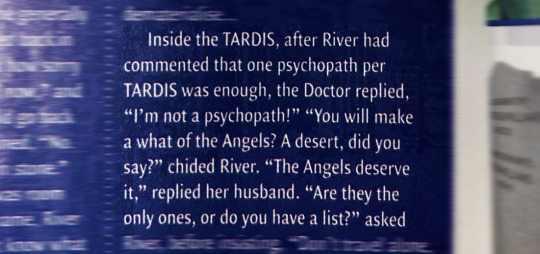




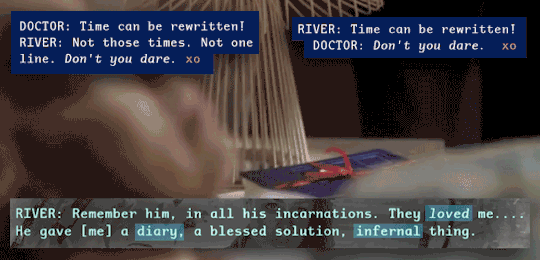
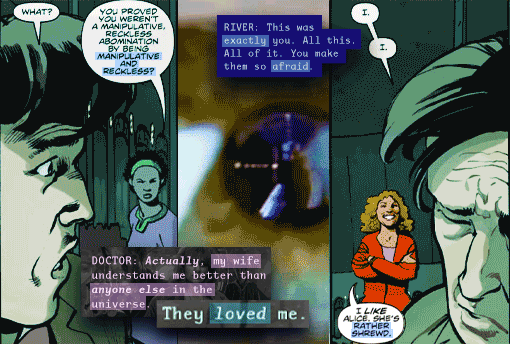



[just after having helped River make a getaway from a heist of an astatine lace shawl — the rarest substance in the universe — without her even needing to ask beyond a simple “hello sweetie” scrawl in the sky]
[Eleventh Doctor] “I can see its worth — but Alice is right! What’s so special about a lace shawl?”
[River] “Ah, well, lace, you see, is the traditional gift for a thirteenth wedding anniversary…”
[Eleventh Doctor] “Wedding anniversary? Whose wedding anniversary?”
[River] “Spoilers…!” *winks*
[Thirteenth Doctor, reminiscing] “I love River.”
HAPPY THIRTEENTH WEDDING ANNIVERSARY TO THE DOCTOR AND RIVER SONG!
Sources: Diary of River Song: The Furies, Diary of River Song: The Lady in the Lake, The Day of the Moon, Doctor Who Magazine Special Edition #33, The Wedding of River Song, The Big Bang, The Angels Take Manhattan, The Many Lives of Doctor Who: Without a Paddle, The Time of the Doctor, Forest of the Dead, Let's Kill Hitler, Diary of River Song: The Wife of River Song, Eleventh Doctor Year Two: Physician Heal Thyself, A Good Man Goes to War, Eleventh Doctor Chronicles: Broken Hearts, The Husbands of River Song, Doctor Who Confidential: When Time Froze
#river song#eleventh doctor#twelfth doctor#tenth doctor#thirteenth doctor#yowzah#edits by seaweed#words by seaweed#I know there's not a lot of 12 and 10 and 13 rep but oh well theres not as much source material. I got like a quote from them each#regular reminder that psychopath has no clinical meaning and is more of a reclaimed slur than a descriptive term etc#reclaimed language#ableist language#this is about them being messy (positive) together. ALSO river was promised Stevie Wonder for her 13th anniversary <3#I HAVE ZERO SOURCES FROM BOOKS WHAT im sure there are some perfect quotes from novels & short stories but well#I got episodes and audios and comics and magazines#did I miss posting a thing for 'fourteen years since fish custard' day a few weeks back? yes. yes I did.#am I trying to make up for it by celebrating a day that references a very specific comic that less people likely heard of? yes. yes i am.#maybe shoulda posted this at midnight last night. April 22 is almost over in the UK I think#okay I gotta go to work now! ima watch Wedding of River Song tonight
113 notes
·
View notes
Text
in my head dan knows we’re in a fight
#source: i’m delusional#i know for a fact you have pj bottoms that don’t have holes in them#AT LEAST NOT UP THAT HIGH#he and i aren’t on speaking terms#being a dannie is so hard#dnp#dan and phil#phan#dan howell#daniel howell#amazingphil#phil lester#danisnotonfire#yeet my deenp#yeet my deet#d&p#danandphilgames#captioned video#needs transcript#needs vd
63 notes
·
View notes